Some Wisconsin policymakers say undocumented immigrants who are parents to American citizens could get a second chance through President Barack Obama’s program that would temporarily protect them from deportation, but other policymakers look to block the program on grounds that it is unconstitutional.
The program, known as Deferred Action for Parents of American Citizens, or DAPA, looks to provide a three-year protection from deportation for parents of American citizens or lawful permanent residents, Rep. JoCasta Zamarripa, D-Milwaukee, said. The program targets undocumented immigrants who face the threat of deportation and leaving their American-born children behind.
DAPA does not give permanent, lawful status to undocumented immigrants, but it gives them a three-year period in which they can obtain driver’s licenses and other forms of legal identification, Zamarripa said. This can help them maintain their legal status beyond the three-year period.
“[DAPA] gets [undocumented immigrants] on the grid, makes them more positive members of community and makes them less fearful to reach out to law enforcement,” Zamarripa said.
U.S. Supreme Court hearing
DAPA was proposed in November 2014, but the U.S. Court of Appeals Fifth Circuit implemented a temporary block against it in February 2015, Maria Sandoval, spokesperson for U.S. Rep. Gwen Moore, D-Wisconsin, said. She said Obama proposed DAPA as a means of changing the nation’s current immigrant policies.
Twenty-six states including Wisconsin signed a brief against DAPA in April, which essentially sues the Obama Administration for the program. Sandoval said the Court of Appeals heard arguments from proponents and opponents of the program April 18 but has not yet reached its final verdict. The Court’s verdict will decide whether or not the program will be implemented, she said.
Zamarripa said the Court’s decision-making process would be interesting because there are an equal number of Republican and Democrat judges. She said a tie in votes against and for the program was possible, which could complicate matters.
Wisconsin Attorney General Brad Schimel said in a statement the Court of Appeals ruled the Obama Administration did not follow the “notice-and-comment” rule making requirement before issuing DAPA. This rule-making requirement asks that if any party has an objection to a ruling, they have to speak up about it before the ruling is finalized.
The Obama Administration did not do that when the Court of Appeals issued a block against DAPA. Instead, the administration decided to issue an executive order to implement the program, which could be a problem for its proponents, Schimel said.
“President Obama’s sweeping immigrations reforms, executed by the stroke of a pen, and not through an Act of Congress or even a properly enacted administrative rule, clearly violate federal law and the Constitution,” Schimel said. “I am proud that Wisconsin has joined a coalition of twenty-six states to stop this type of legislation through executive action.”
Schimel said if DAPA passed, the state would have to provide work permits, social security cards and other identification to more than 4.3 million “illegal immigrants,” which could incur a high cost.
DAPA also conflicts with federal immigration law, which mandates removal of undocumented immigrants, Schimel said. He said the court was against the idea of going against federal laws to temporarily give “illegal aliens” lawful status.
Integrating undocumented immigrants into Wisconsin’s community
Obama implemented a similar policy through executive orders in June 2012 called Deferred Action for Childhood Arrivals, or DACA, Zamarripa said. This policy targets undocumented immigrant children who are brought to the U.S. due to “no fault of their own.” It gives them a legal status but does not give them citizenship, she said.
Zamarripa said DACA has been very successful in improving the lives of undocumented immigrant children and believes DAPA will do the same. She said DAPA would give security to parents with American children and make them better members of Wisconsin’s community.
“These are productive members of society who work hard and want to be folded into the fabric of the community,” Zamarripa said. “I see nothing but positives if we are able to move forward with DAPA.”
Wisconsin legislators also created their own legislation regarding immigrant workers. One bill that would prevent local municipalities from issuing IDs to undocumented workers passed the Senate 62-35 in February and currently sits on Walker’s desk.
Another bill that would fine cities for blocking police officers from asking criminal defendants about immigration status passed through the Assembly, but was not taken up in the Senate this legislative session.
A partisan issue
Wisconsin’s Democrat legislators are largely in favor of DAPA, but Republicans are not. Zamarripa said the policy was a way to implement comprehensive immigration reform, which she thinks the country still lacks.
“It proves to me that the highest ranking Republican in the state continues to show his anti-immigrant colors and it’s very detrimental for Wisconsin considering the Latino community, which is the fastest growing constituency in the state, is involved,” Zamarripa said.
Walker said in a statement that Obama’s executive orders are beyond his constitutional power as president. He called the policy “an unconstitutional usurpation of official lawmaking authority.”
The 26 state governors filing against DAPA are all Republican and believe Obama was acting above the law when he implemented DAPA.
“This brief challenges the president’s overreach and addresses the consequences of limitless executive power under our three branch government system,” Walker said.
U.S. Supreme Court will release its final verdict on DAPA June end.
Republican Party of Wisconsin and Wisconsin Department of Justice did not respond to requests for comment.


